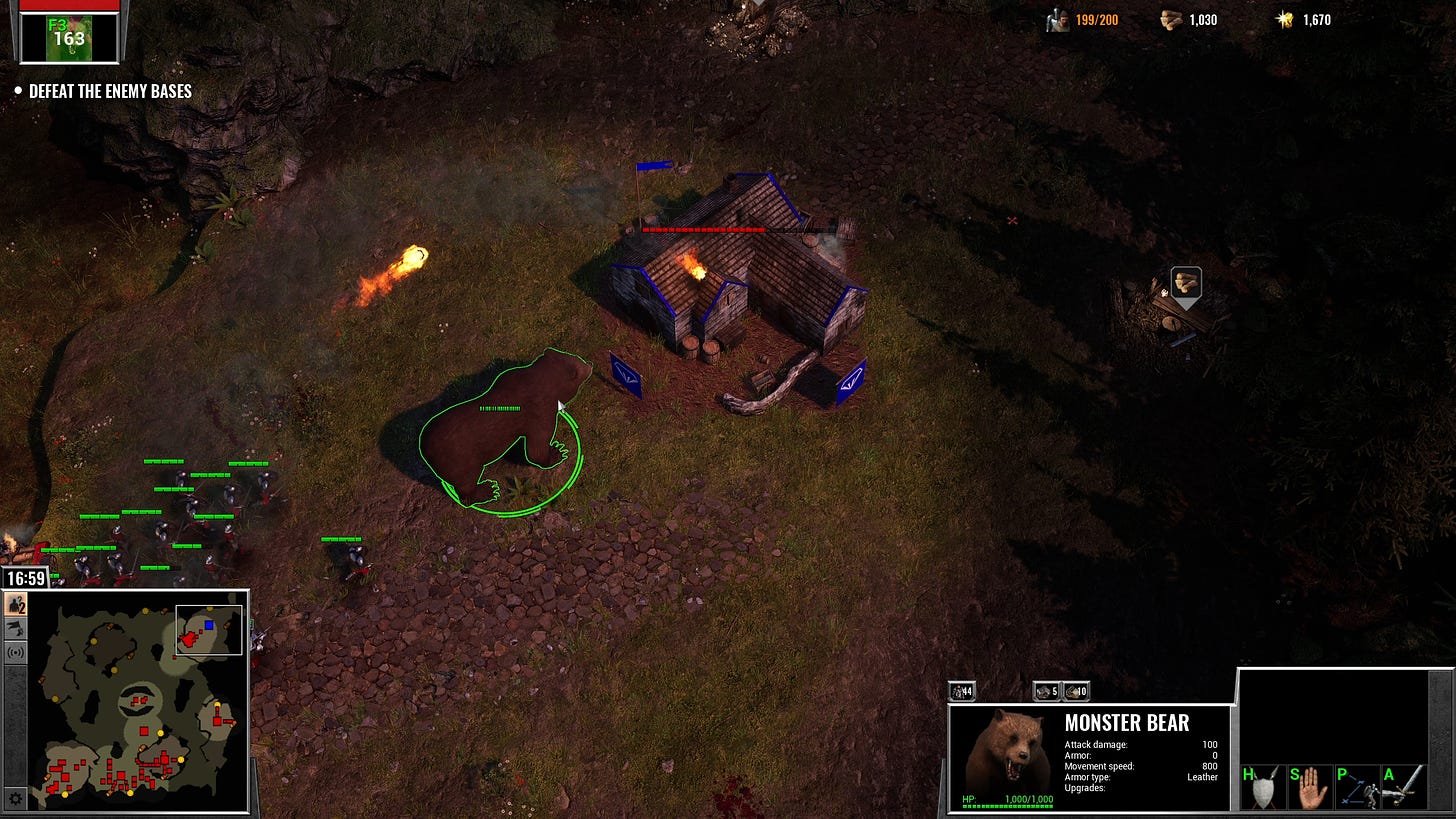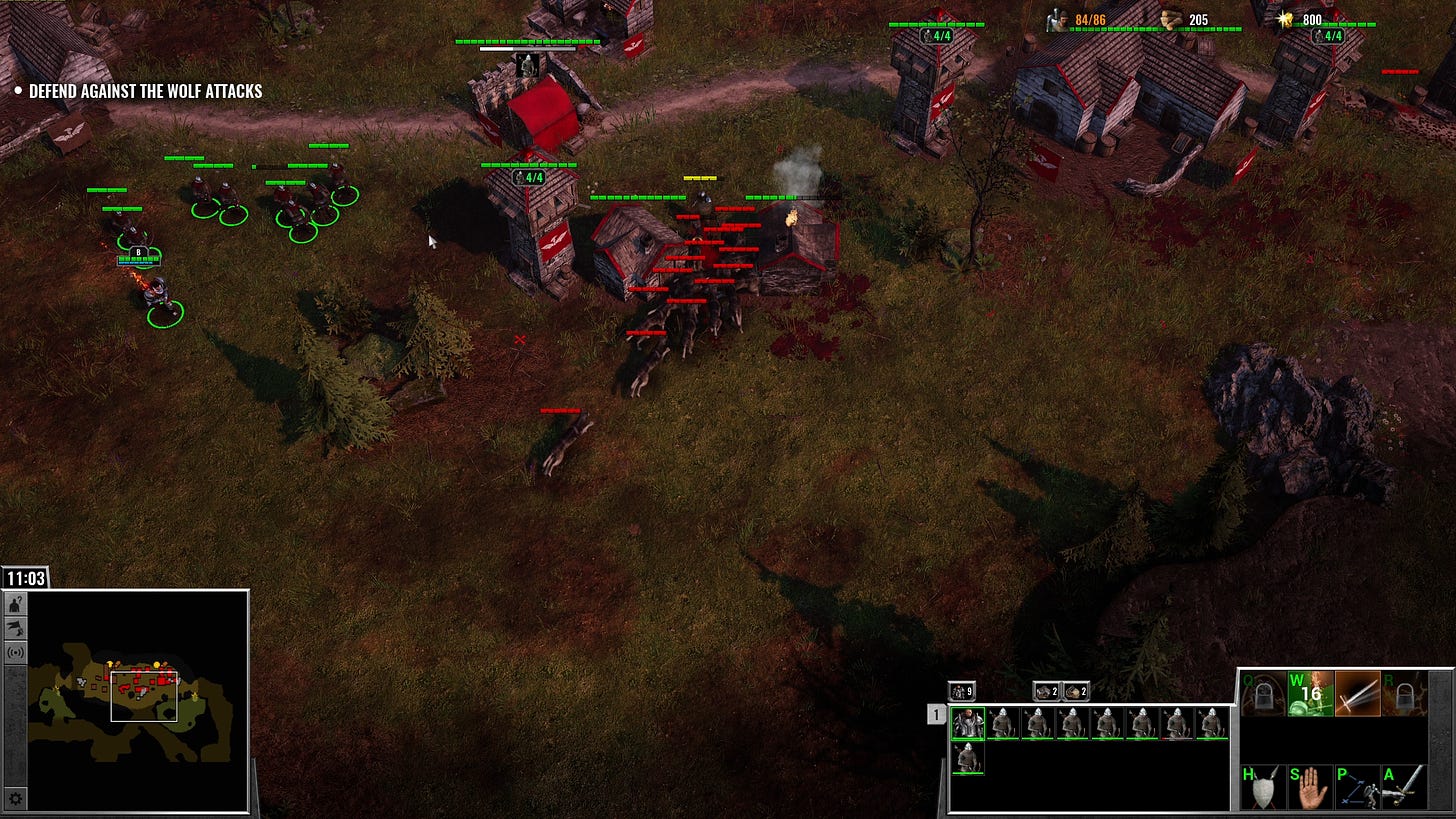In late January I picked up Bannermen, an indie RTS developed by Pathos Interactive and released in 2019. I initially wrote a fairly irreverent review of what I found to be a fairly irreverent, if flawed, game; but the idea of making fun of someone else’s blood, sweat and tears gave me pause, and I left the article in my drafts. This week I decided to repurpose it into a more serious review, with the hope of fairly assessing what goes wrong with this title and what other creators in the RTS space might take away from it.
RTJMUMF
After playing through Bannermen’s 23-mission campaign, I realized it was the world’s very first RTJMUMF - real-time just-mass-units, motherf***er. And while I still chuckle at my own genius humor, I also think it’s a legit issue that plagues a number of games in the real-time strategy space.
At least 10 of Bannermen’s campaign missions - about half the content! - are little more than skirmishes against the AI. Typically, they boil down to something like this set of objectives from Mission 17:
Bannermen is thought-provoking not because it draws from this well of bad campaign design so regularly, but because it does it so transparently. The truth is, a lot of campaigns in the RTS space boil down to building up your base, massing up a bunch of units, and A-moving across the map. Other games may hide it better, but materially there isn’t much of a difference. And the term I first read to describe this - build-a-base-itis - was coined not to critique some random independent game, but in response to the acclaimed Warcraft III.
Base-building-as-campaign-design pops up everywhere, from big titles like Age of Empires IV and Warcraft III to smaller independent games like They Are Billions and Grey Goo. It’s a big problem in this genre.
It’s ironic to me that I’m the one to regularly point this out, because I’m often the first to observe how people underrate the importance of RTS mechanics to RTS players, and that attempts to paper over the basic mechanics of these games often cause more harm than good. But there’s gotta be more to an RTS campaign than just the core mechanics of the title. There’s so much you can do, like a neat creative idea (the introduction to the Goo), a highlight of a particular game mechanic (The Dig), a compelling narrative idea (The Culling of Stratholme), a particularly interesting map (Cape Storm), etc. It’s fine to have a few missions where you highlight how fun the base gameplay is, but that can’t be the centerpiece of your campaign.
The problem is less that skirmishes against the AI aren’t fun, and more a simple failing to capitalize on what a campaign can be. Spend an afternoon with Wings of Liberty, for example, and it’s almost like you can’t go back to most other games in this genre - you can’t help but notice how much of a missed opportunity it is that so many games see campaigns in such a shallow light.
It’s easy to criticize Bannermen, because it’s a small indie product with the sorts of issues you’d expect from a game with that kind of budget. But Age of Empires IV has the exact same problem, and it’s the closest we’ve gotten to AAA in the RTS space in a long time. This is a genre-wide issue, and it needs to be treated as such.
It’s My Party And I Can Cry If I Want To
Now, it’s fair to say that Bannermen takes campaign design problems to a new level due to its basic unit and economy design. Specifically, it does not appear to care very much about its own basic unit and economy design, at least as far as the campaign goes.
It’s not to say that Bannermen doesn’t have a counter system, or interesting mechanics, or the standard-fare stuff you look for in an RTS game. It’s that the campaign doesn’t seem to think that any of that matters at all, as it features mission after mission of the AI receiving an incredibly unfair quantity and variety of free units. It’s hard to find depth in the mechanics when facing endless waves of units from the first few minutes of the game.
I really did try to understand the nuances between different tiers of units (e.g. archers and footmen, spearmen and vanguards, jesters, convincts, knights, etc). The costs, the counters, the microability, etc. But aside from highlighting the splash damage of the convict in an early mission, the campaign really makes no attempt to show the player why these are different units, what they’re intended to do, how they’re intended to be used, or really anything of the sort.
Bannermen does rest on top of a creative vision - specifically, a faster paced game focused on individual unit control. But nothing about the campaigns (including the tournament-style missions) explores that at any level of depth. And I say that as someone who really tried to get it, because I like how fast-paced the game is. It’s almost like the developers thought they could turn up the game speed and DPS a little bit, throw some units on the screen, and wala, a game about unit control. But that’s not a creative vision; it’s arrogance wrapped in laziness.
I’ve written about the perils of creating a knock-off before. But I actually think the criticism Bannermen receives for copying mechanics from other games is misplaced. Sure, I also think it’s funny that the default select-all army hotkey is F2. Yes, I also laughed when I saw that mission six effectively takes place on Frost. But personally I find these to be superficial issues. The problem with Bannermen is not that it lacks a creative vision relative to the RTS games it borrows from; the problem is that it doesn’t bother to show you why that vision is interesting or worth exploring.
It’s not enough to simply develop “famous game X, but better”. But it’s also not enough to simply declare that you have a vision, and then expect that everyone else will immediately get it. Accessibility isn’t just showing people how to play your game; it’s also showing them how to enjoy your game, showing them what makes your game fun. And that’s something Bannermen fails to do well.
A Good Time
I did enjoy Bannermen, regardless of my critiques. Remember, this is a game which opens by fighting against a literal armada of wolves, because why not:
I think it’s unfair to criticize this game without noticing its problems are shared by many others in the RTS space; it’s just not as good at hiding them. And from that perspective I’m happy to defend the title. If you’re going to mock Bannermen for some of the bolder decisions that it makes, then I think you’ve gotta be honest and realize the degree to which these problems plague the genre as a whole.
Except the genre as a whole doesn’t allow you to command massive bears, does it?

Until next time!
brownbear
If you’d like, you can follow me on Twitter and Facebook and check out my YouTube and Twitch channels.






